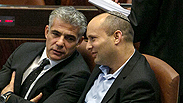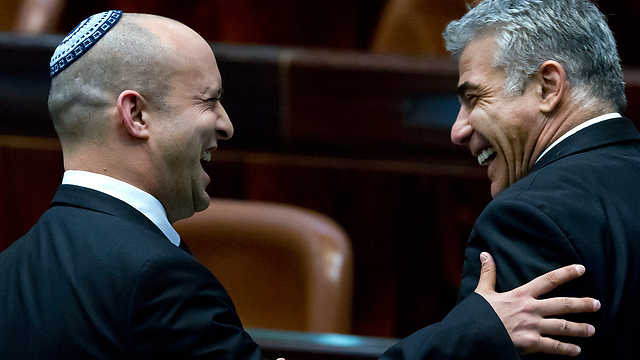
Lapid admonishes Bennett during Protective Edge: 'Stop playing with the generals'
Newly released transcripts of cabinet deliberations during the 2014 war show discord between the two former allies and the arguments over whether to accept ceasefire proposals.
Newly released transcripts of cabinet meetings during the 2014 Operation Protective Edge in Gaza reveal the extent to which Minister Naftali Bennett clashed not only with then-defense minister Moshe Ya'alon but also with then-finance minister Yair Lapid.
July 1, 2014: 'We are ready with plans'
It was a very tense day. A day prior, the bodies of Naftali Frenkel, Gild-Ad Shaer and Eyal Yifrach—three teenagers kidnapped in Gush Etzion and murdered by Hamas terrorists—were found.
The tension which had been building over the previous days led to a clash in the cabinet between Bennett and Ya'alon, during which the former, who then served as minister of economics, hurled accusations at the then-defense minister: "Our response to this attack has been weak and disgraceful so far."
A day later, it was Lapid's turn to enter the fray, in light of Bennett's apparent interference in the management of the military and his tendency to insist on being apprised of the operational details during deliberations.
At the time, Lapid was taking a more cautious and restrained approach, and almost always supported the military's operational proposals.
Bennett, for his part, was more aggressive, especially when it came to issues involving retaliation for missile attacks from Gaza and the looming threat of the tunnels.
This served as the backdrop for the argument that was brewing in the room, which demonstrated the apparent lack of coordination between Prime Minister Benjamin Netanyahu and his defense minister, Ya'alon on how to handle the tunnel threat, as well as then-IDF Chief Lt. Gen. Benny Gantz's objection to an extensive operation in Gaza.
"I demand a plan for the tunnels," Bennett said.
"The tunnel problem is new and we have no response," Prime Minister Netanyahu noted.
"We are ready with plans," Ya'alon clarified.
"I don't see a necessity for a Gaza operation," Gantz asserted.
"The debate about neutralizing the tunnel threat is not for the cabinet," Lapid told Bennett. "This isn't a battalion commanders' forum."
"This is really not for battalion commanders, this is for the cabinet," Bennett insisted.
"Stop playing with the generals," Lapid retorted.
About four weeks later, on July 27, after dozens of soldiers had been killed during the ground offensive in Gaza, Ya'alon accused Bennett of contacting senior field officers behind his back and undermining him.
"You will not run my army, you will not come from the field and tell me, 'we should do this, we shouldn't do this,' you hear?" the engraged defense minster said.
"I will, if the truth is not being reported," Bennett insisted.
July 15, 2014: 'We didn't actually win'
A week into the operation and two days prior to the launch of the ground offensive in Gaza, the cabinet deliberated on the possibility of a ceasefire, one of six such proposals during the war, in addition to several respites.
In hindsight, these discussions reveal the way in which cabinet members and top defense officials analyzed that which was happening on the ground during those critical days, and the majority's assessment that the fighting could have been brought to a halt on that day rather than 43 days later, as things actually unraveled.
Bennett and then-foreign minister Avigdor Lieberman objected to a ceasefire at that time. But even those who were in favor of halting the fighting—then-communications minister Gilad Erdan and then-science minister Yaakov Peri, who attended the Security Cabinet's deliberations as an observer—demanded assurances for the elimination of the tunnel threat and of rocket fire.
Among the speakers was the head of the Military Intelligence Directorate at the time, Aviv Kochavi, who currently serves as the GOC Northern Command and will soon step into the role of Deputy Chief of Staff.
"There is willingness on Hamas's part to end the escalation. That much is clear," Kochavi told the gathered officials.
"The IDF's accomplishments are excellent. Now we need to decide whether we accept the ceasefire," IDF chief Gantz said.
Ya'alon asserted that the ceasefire offer should be accepted, declaring that "If Hamas was counting its losses, it would have said what (Hezbollah leader) Nasrallah said after the Second Lebanon War: 'Had I known how this would end, I wouldn't have gotten into it.'"
"We've won," Netanyahu said. "We inflicted 180 losses (of lives) on them. We must demand the demilitarization of the tunnels and the elimination of rockets."
"I vote for a ceasefire, but we must demilitarize the tunnels and rockets," Peri concurred.
Bennett maintained his previous position, objecting to the ceasefire on the basis that "The tunnels haven't been destroyed, we must destroy them first."
"I support (the ceasefire), but Israel's deterrence suffered—since we have not actually won," Erdan noted.
Lieberman, butressing Bennett's objections and concerns, called to "topple Hamas's rule."
"We are living in between respites. There is no one decisive blow," Ya'alon explained. "There is potential for a ceasefire and we must take it."
At the end of the discussion, and with a majority of six in favor versus two against, the cabinet decided to accept the ceasefire.
But that ceasefire lasted less than five hours before Hamas renewed its bombardment of Israeli towns and cities obliging, the following evening, the security cabinet's members to reevaluate the situation along with Military Intelligence representatives.
During this discussion too, Bennett pushed the aggressive approach, which led to his clash with the defense minister.
"The door is not closed yet. They are not looking for escalation, just to improve their conditions," Kochavi said.
"Hamas does not intend to violate the ceasefire," Ya'alon interjected.
"We need to strike while they are in siege," Bennett asserted, only to be told by Ya'alon that "They're deterred."
The following six weeks of fighting indicate how problematic an attempt to interpret Hamas' intentions at the time actually was, at least based on how the Hamas calls for ceasefire were perceived in that discussion.











